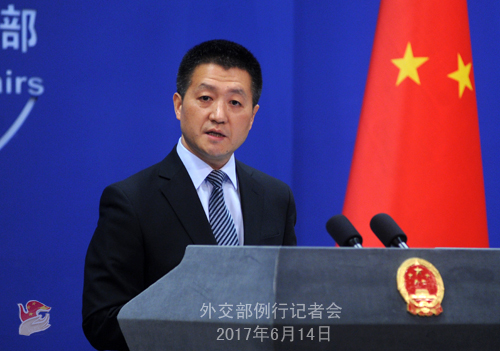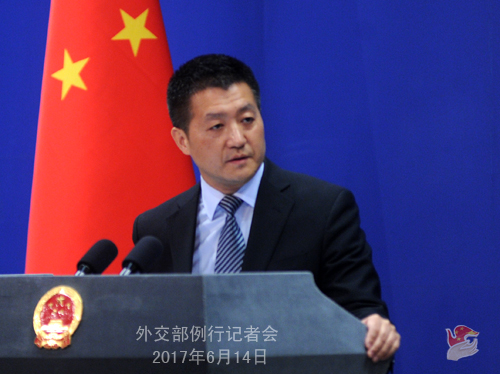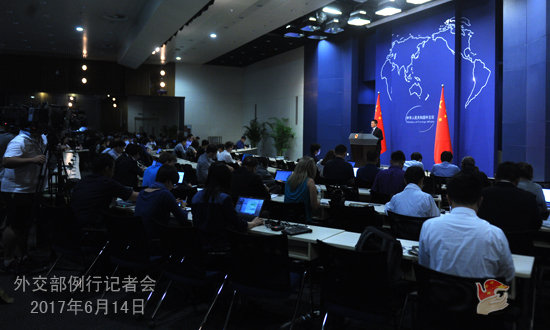
Q: Yesterday, the announcement of the establishment of diplomatic ties between China and Panama grabbed international attention. The Chinese leaders and Foreign Minister Wang Yi have all spoken on this. I am wondering whether you as the Spokesperson have anything more to say.
A: We have noted the extensive reports at home and abroad on the official establishment of diplomatic ties at the ambassadorial level between the People's Republic of China and the Republic of Panama. The international media commented a lot on this, and the Foreign Ministry Spokesperson's Office also received a lot of inquiries on this issue. Here, I would like to reaffirm China's position.
On June 13, Foreign Minister Wang Yi and Isabel Saint Malo de Alvarado, Panama's Vice President and Foreign Minister, signed in Beijing a joint communique on the establishment of diplomatic relations between the People's Republic of China and the Republic of Panama on behalf of their respective government. According to the communique, the Chinese and Panamanian governments have decided to recognize each other and establish diplomatic relations at the ambassadorial level effective from the date of signature of the communique.
There is but one China in the world. The Government of the People's Republic of China is the sole legal government representing the whole of China, and Taiwan is an inalienable part of China's territory. These are historical facts as well as well-acknowledged norms guiding international relations.
Panama is an important Latin American country. The amicable exchanges between the Chinese and Panamanian people date back a long way. The Chinese people have profound friendship with the Panamanian people. The Panamanian government acknowledges the one China principle and promises to stick to it. It chooses to cut off the so-called "diplomatic ties" with Taiwan and establishes diplomatic relations with the People's Republic of China, which is a right choice that meets the trend of our times and the wishes of our people. China highly commends that.
On the basis of the Five Principles of Peaceful Coexistence and the one China principle, China stands ready to develop and deepen all-around friendly cooperation with Panama and deliver more benefits to the two countries and peoples.
Q: Does the establishment of diplomatic relations between China and Panama means the end of the "diplomatic truce" across the Straits? Will the mainland establish or resume diplomatic relations with more countries which have the so-called diplomatic ties with Taiwan? Will there be any major adjustments in the policies of the Chinese central government towards Taiwan?
A: As for your last question, I would refer you to the Taiwan Affairs Office of the State Council.
The one China principle is the major principled position which concerns China's core interests and the feelings of the 1.3 billion Chinese people. It is also the prerequisite and the political basis for China to maintain and develop friendly cooperative relations with other countries in the world. The Chinese government stays committed to developing friendly cooperative relations with other countries in the world on the basis of the Five Principles of Peaceful Coexistence and the one China principle.
Looking around the world, China's circle of friends is growing bigger and bigger. Refusing to recognize the 1992 Consensus will end up nowhere. Only by coming back to the right track set in the 1992 Consensus and recognizing that both sides across the Taiwan Straits belong to the one and same China can there be preconditions and basis for the peaceful development of the cross-Straits relations and can the common aspiration of the people across the Straits for pursuing common development, sharing opportunities and jointly scoring glorious achievements be realized.
Q: Some Canadian opposition parties want to stop the takeover of the Canadian company Norsat by Chinese investors. They are citing national security concerns. Are your still confident that the takeover will be completed?
A: For this specific takeover case you mentioned, I still need to check on the latest development. I also suggest that you ask the competent authority for relevant details. In principle, we believe that an open, liberal and fair environment for investment and trade is beneficial to both China and Canada. We hope that the Canadian government can offer a sound environment for Chinese enterprises investing in Canada.
Q: Previously there were African media reporting on the President of Uganda ordering investigation into Ugandan wildlife protection officials colluding with two Chinese diplomats in Uganda to smuggle ivories. The Foreign Ministry of Uganda put up a statement on June 12 saying that thorough investigation revealed that the two Chinese involved were not diplomats and expressing regret for the possible negative consequences this incident might have caused to the Chinese Embassy in Uganda. The Ugandan government reaffirmed its commitment to deepening bilateral friendship. What is your comment?
A: China has taken note of the statement by the Ugandan Foreign Ministry. We commend the positive remarks made by the Ugandan side on clarifying the situation and reaffirming its commitment to strengthening bilateral friendship.
I want to stress again that the Chinese government officials, including officials working at China's diplomatic missions overseas, and visiting delegations for public affairs are under strict discipline requirements and regulations enacted by the Chinese government. They are strictly prohibited from buying, conducting transactions on, or carrying any endangered wildlife or their products. Once found, such violations will be dealt with firmly in accordance with law.
We resolutely support Uganda and other African countries in handling relevant cases in strict accordance with law.
Q: US President Trump has agreed to deploy more troops in Afghanistan. Do you have any comment on this?
A: Peace and stability of Afghanistan bears on the regional security and development. We maintain that any action by any party should respect the sovereignty and territorial integrity of Afghanistan and should be conducive to the peaceful reconciliation process and peaceful reconstruction of Afghanistan as well as the regional peace, stability and development.

Q: Report from Kabul said that China has undertaken a mediation between Afghanistan and Pakistan, especially relating to terrorism issues. What is your commennt?
A: I haven't seen the report you mentioned. In principle, the Chinese side has all along supported the Afghan-led and Afghan-owned peaceful reconciliation process and the peace process of Afghanistan. Meanwhile, we hope that the relevant regional countries can strengthen solidarity and cooperation, jointly combat terrorism, work for regional peace and stability, and create enabling conditions for common development and prosperity of the region.
Q: The US State Department officials said that the US opposes any unilateral action by either side across the Straits to change the status quo of the Taiwan Straits, urging concerned parties to engage in dialogues and avoid escalatory and destabilizing moves. What is your comment? Also, Taiwan officials said that before Panama announced its decision to establish diplomatic ties with China, Taiwan asked the US to mediate, but failed. Can you confirm whether or not the US was involved in this?
A: First of all, the one China policy is an open pledge made by the US government since the establishment of diplomatic ties between China and the US. Second, the past experience has shown that only by sticking to the 1992 Consensus, which incorporates the one China principle, can we create a favorable condition for the existence of stability, peace and positive interactions across the Straits. Any deviation from the 1992 Consensus will only result in greater instability across the Straits. We believe the US side is very clear about that.
As for whether or not the Panamanian government had any contact with the US government, I don't have any information.
Q: Following the statement last night by the Foreign Ministry about the investigation into the two Chinese national kidnapped in Pakistan, do you have any update? Second, the Global Times published a report yesterday that carried some details. It said that the two were working for a ROK missionary group. Can you confirm that?
A: You've seen the statement we issued yesterday. I can repeat that the Chinese side has been highly concerned about the information that the two kidnapped Chinese in Pakistan might have been killed. So far, the Pakistani side has yet to finally confirm the aforementioned information to China. We will continue to do our best and coordinate with the Pakistani side to verify as soon as possible the relevant situation.
As for your second question, we also said in the statement that we always ask Chinese nationals living and traveling overseas to observe local laws and regulations, respect local customs and practices, and heighten awareness for potential risks. As for reports on Chinese nationals allegedly engaging in illegal preaching activities in Pakistan, we will work with the Pakistani government to carry out investigation in accordance with law.
Q: Former US NBA star Rodman paid a visit to the DPRK yesterday. During his visit, the DPRK announced the release of an American student who had been detained in the DPRK for 15 months. Does China believe that this move corresponds with China's position to resolve the Korean nuclear issue peacefully through dialogue and consultation?
A: You mentioned two things, but whether they have any causal relations, you might need to ask the parties directly involved since we don't know much. But my feeling is that this is surly a positive move. In principle, we welcome and support the US and the DPRK, as two parties directly involved in the Korean nuclear issue, in strengthening mutual understanding and mutual trust through dialogues and contacts, make political decisions as soon as possible, and take concrete actions to work constructively for the settlement of the relevant issue through dialogue and consultation.
Q: It is reported that US officials are considering measures to restrict Chinese investment in advanced technology, such as artificial intelligence, because there are concerns that the Chinese are getting around existing measures to acquire sensitive technologies. What is your comment?
A: It is just like my answer to the question on the Chinese enterprise taking over the Canadian company. For individual commercial cases and takeovers, we don't have specific details. We suggest you ask the competent authority for more details. In principle, normal business takeovers shall follow business rules and the laws of the market. We believe there should not be undue political dimensions imposed on commercial takeovers, let alone political intervention. The economic and trade cooperation between China and the US is in nature for win-win results, as has been repeated by us many times. Therefore, we also hope that the US side can provide a sound environment for Chinese enterprises to invest and start business in the US. Facts have proven that a sound pair of trade and investment relationship between China and the US brings tangible benefits to the two sides.
